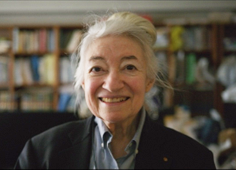In 1992 Clifford C. Clogg published a landmark paper in Statistical Science highlighting the impacts of statistical methodology on sociology and of sociological methodology on statistics. The paper, with four comments and Clogg’s reply, all focused on empirics. Earlier, Robert K. Merton (1949) had discussed the reciprocal impacts of theory and empirics in sociology and James S. Coleman (1964) had observed that “in the development of any science, two things are crucial: systematic empirical study and systematic conceptual elaboration … [and each] requires its special tools.” Thus, we represent a science by the fourfold classification above. And to visualize the interplay across disciplines, we trace the lines from one or more of the four cells for one discipline to one or more of the four cells for another.
“How Sociology Advances Statistics”
As Clogg understood, substantive questions sometimes arise in sociology for which there is no ready answer. To illustrate, consider status, which is thought to increase at an increasing rate with rank on characteristics like beauty and wealth, generating a standard exponential distribution. But suppose that status arises from multiple characteristics, and suppose further that these characteristics are differently associated (positive, negative, independent). It was already known that if two characteristics are equally weighted and independent, the ensuing status distribution is Erlang. But what if two characteristics are perfectly negatively associated? In this case, the sociological question led to derivation of a new status distribution, which was christened the ring(2)-exponential and which in turn led to two new families of distributions which may prove useful in statistics and in other applications in science and engineering.
About Guillermina Jasso
Guillermina Jasso is Silver Professor of Arts and Science and Professor of Sociology at New York University. She was the founding director of the Methods Workshop at New York University (1991–1997) and the founding director of the Theory Workshop at the University of Iowa (1988–1991), as well as a co-founder of the Life Course Center at the University of Minnesota. She served as Special Assistant to the Commissioner of the U.S. Immigration and Naturalization Service (1977–1979) and as Director of Research for the U.S. Select Commission on Immigration and Refugee Policy (1979–1980). She served as Chair of the Department of Sociology at New York University in 2012–2015.
Jasso has written extensively on basic sociobehavioral theory, inequality, distributive justice, status, international migration, probability distributions, mathematical methods for theoretical analysis, and factorial survey methods for empirical analysis. Her contributions include a mathematical formula for fairness assessment, a formula showing how overall injustice can be decomposed into injustice due to poverty and injustice due to inequality, and two new families of probability distributions. She has published widely in scholarly journals, including two articles which won awards from the Population Section of the American Sociological Association and the Law and Society Association. She is a Principal Investigator of the New Immigrant Survey, the first national longitudinal survey of immigrants in the United States.


Occurrences
-
Wednesday, April 3, 2024, 11:30 a.m.–12:45 p.m.